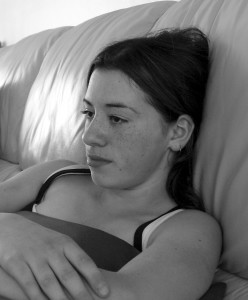 Depression usually begins between the ages of 15 and 30, and it can affect anyone—even younger teens and children. It is not just an adult problem – even young people can experience mental illnesses like depression and anxiety. While we don’t know exactly what causes depression, many factors are likely involved. These include heredity, personality, life events, and individual changes body chemistry, even in children. Certain medications and physical illnesses can also contribute to depression.
Depression usually begins between the ages of 15 and 30, and it can affect anyone—even younger teens and children. It is not just an adult problem – even young people can experience mental illnesses like depression and anxiety. While we don’t know exactly what causes depression, many factors are likely involved. These include heredity, personality, life events, and individual changes body chemistry, even in children. Certain medications and physical illnesses can also contribute to depression.
It may seem difficult to understand how children could have problems that would lead to depression, but adults may forget what it’s like to grow up – the pressures they feel, and the lack of control they have over their own lives can be very hard for some children. While their problems may seem simple to us, they can feel overwhelming to young people. It’s important to treat depression in young people seriously.
Signs and Symptoms
Recognizing depression in children and teens can be more difficult than in adults because young people are already undergoing many developmental changes. It may be difficult to distinguish between what are ‘normal’ hormonal changes and what may be a problem. it may be difficult to get your child to talk about their feelings, or they may have explanations for how they seem. However, if you still feel that something is wrong, listen to your instinct. Here are the signs of changes due to depression that you can watch out for:
Physical changes: Your child may have physical complaints such as headaches or general aches and pains that have no apparent cause. They may feel tired all the time, sleep more than usual or have trouble sleeping. They may have appetite changes, unexpectedly gaining or losing weight.
Behavioural changes: Your child might seem unusually withdrawn around other people, cry easily, or show less interest in sports, games, or other fun activities they used to enjoy. They might have sudden outbursts of anger or tears and over-react to small incidents.
Emotional changes: Your child may show signs of being unhappy, worried, guilty, sad, angry, fearful, helpless, hopeless, lonely.
Changes in thinking: Your child may use language that indicates low self-esteem, self-dislike or self-blame—for example, they may say, “no one likes me” or “I’m so useless”. They may only talk about themselves negatively. They may have a hard time concentrating. In some cases, they may show signs that they’re thinking about suicide.
These changes may be a normal part of going through the upheaval of puberty. Or these changes may be signs of mental health problems. It’s important to look at the changes in a bigger context:
• How intense are the changes?
• How do they impact your child’s life?
• How long are the changes lasting?
Talk to your child about how they’re feeling if you’ve noticed several changes for more than a couple of weeks.
Treatment
Children, teens, and adults can all recover from depression. Depression is treatable. For children and teens in particular, early treatment is important so they can get back on course with their normal developmental goals as quickly as possible.
Support for a young person who experiences depression may come from several different people and places. Your family doctor is often the first place to start, but you may also find support through a counsellor. Many communities and schools offer programs and personnel that can support children’s mental health. It may be useful to speak to your child’s teacher or school counsellor about any changes they may have noticed as well.
Counselling
Most people find help for depression from counselling using cognitive-behavioural therapy (CBT). CBT teaches people how their thoughts, feelings, and actions work together. It also teaches skills such as healthy thinking, problem solving, and stress management. CBT has been proven through many studies to be an effective treatment and prevention for depression.
Eating well, exercising, spending time with others, and making time for fun activities are part of counselling “self-care strategies” that will help your child to stay well.
Support groups may also be helpful. Support groups are an opportunity to share experiences and learn from others. There are also groups specifically for caregivers and family members.
Medication
Your child may benefit from an antidepressant if other options don’t seem to help. Antidepressants are a specific group of medications which target the chemistry of the brain to treat depression and other mental illnesses. The decision to use medication must be well-considered, especially if your child is young. While medications can be helpful, there may be extra risks and side-effects to consider. Have an thorough discussion with your physician about the risks and benefits so you can have your questions answered and can make the best decision for your child. Counselling is usually the preferred option over medication for children under the age of 18.
At Stillwater Studio, Megan Hughes uses CBT with older children and adults, and play therapy or art therapy with younger children. If the depression has any roots in trauma, Megan also uses EMDR to alleviate the symptoms.
For more information:
www.cmha.ca
www.camh.ca
www.mooddisorders.ca
www.heretohelp.bc.ca
www.depressionhurts.ca
